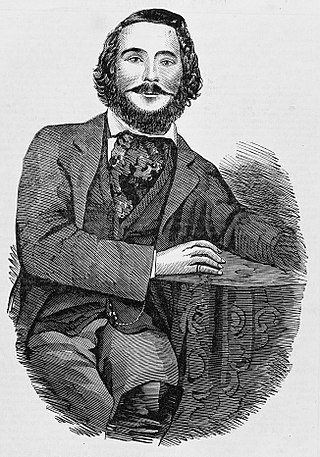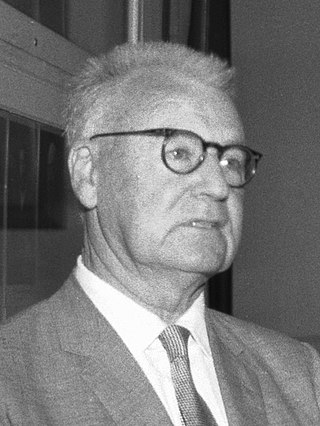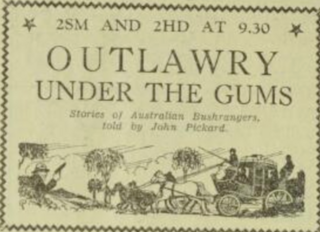Related Research Articles

Bushrangers were armed robbers who hid from authorities in the bush of the British colonies in Australia. The earliest use of the term applied to escaped convicts in the early years of the British settlements in Australia. By the 1820s, the term had evolved to refer to those who took up "robbery under arms" as a way of life, using bases in the bush

Ben Hall was an Australian bushranger and leading member of the Gardiner–Hall gang. He and his associates carried out many raids across New South Wales, from Bathurst to Forbes, south to Gundagai and east to Goulburn. Unlike many bushrangers of the era, Hall was not directly responsible for any deaths, although several of his associates were. He was shot dead by police in May 1865 at Goobang Creek. The police claimed that they were acting under the protection of the Felons Apprehension Act 1865, which allowed any bushranger who had been specifically named under the terms of the Act to be shot, and killed by any person at any time without warning. At the time of Hall's death, the Act had not yet come into force, resulting in controversy over the legality of his killing.

Frank Gardiner was an Australian bushranger who gained infamy for his lead role in the a robbery of a gold escort at Eugowra, New South Wales in June 1862. It is considered the largest gold heist in Australian history. Gardiner and his gang, which included bushrangers Ben Hall, John O'Meally, Johnny Gilbert, Henry Manns, Alexander Fordyce, John Bow and Dan Charters, made off with a pile of cash and 77 kilograms of gold, worth about $10 million today. After several years in prison for the robbery, Gardiner was exiled and moved to the United States, where he died in or about 1882.

Henry Johnson, better known by his alias Harry Power, was an Scottish-born convict who became a bushranger in Australia. From 1869 to 1870, he was accompanied by a young Ned Kelly, who went on to become Australia's best known bushranger.

Francis Patrick Clune, OBE, was a best-selling Australian writer, travel writer and popular historian.

Dan Morgan is a 1911 Australian film from Charles Cozens Spencer about the bushranger Daniel Morgan. It was said to be starring "Alfred Rolfe and company". Rolfe directed three movies for Spencer, all starring himself and his wife Lily Dampier so there is a chance he may have directed this one and that it starred his wife. A prospectus for the Australian Photo Play Company said he directed it. It is considered a lost film.
The bushranger ban was a ban on films about bushrangers that came in effect in Australia in 1911–12. Films about bushrangers had been the most popular genre of local films ever since The Story of the Kelly Gang (1906). Governments were worried about the influence this would have on the population and bans against films depicting bushrangers were introduced in South Australia (1911), New South Wales and Victoria (1912).
The Kelly Gang; or the Career of the Outlaw, Ned Kelly, the Iron-clad Bushranger of Australia is an 1899 Australian play about bushranger Ned Kelly. It is attributed to Arnold Denham but it is likely a number of other writers worked on it.

The Pathway to the Sun is a 1949 novel by Australian author E. V. Timms. It was the second in his Great South Land Saga of historical novels.

Edward Irham Cole was an Australian theatrical entrepreneur and film director whose productions represented a synthesis of Wild West show and stage melodrama. He managed a theatre company, called the Bohemian Dramatic Company, that performed in semi-permanent and temporary tent theatres. During 1910 and 1911 Cole directed a number of silent films, adapted from his stage plays and using actors from his theatre company.

Outlaws of the Leopolds is a 1952 non-fiction history book by Ion Idriess. It concerned the aboriginal resistance leader Sandamara in the 1890s.

Gold Escorts were common across Australian goldfields, transporting mined and processed material from mines to banks and mints across the country.

Outlawry Under the Gums is a 1933 Australian radio series about bushrangers. It ran until 1934 and was produced by John Pickard.
The Viking of Van Diemen's Land: the stormy life of Jorgen Jorgensen is a 1954 Australian book by Frank Clune and P.R. Stephensen about Jørgen Jørgensen.
Overland Telegraph is a 1955 Australian book by Frank Clune about the construction of the Overland Telegraph. It is one of Clune's best known works.
The Kelly Hunters is a 1954 Australian book by Frank Clune about the hunt for bushranger Ned Kelly.
The King of the Road is a 1900 Australian play performed by Edward Irham Cole performed by Cole's Bohemian Drama Company about the bushranger Ben Hall.
Captain Melville is a 1956 Australian book by Frank Clune about the bushrnager Captain Melville. It was one of a series of influential books about bushrangers by Clune.
Captain Starlight, also known as Starlight, is a 1945 Australian book by Frank Clune about the inspirations for Captain Starlight in the novel Robbery Under Arms. It was published by Hawthorne Press. According to Catholic Weekly "the author seeks to discover who was Captain Starlight of Rolf Boldrewood's famous Robbery Under Arms."
Ben Hall the Bushranger is a 1947 Australian historical novel by Frank Clune about the bushranger Ben Hall. It tried to focus on Hall's motivations.
References
- ↑ "Exciting New Novel By Frank Clune". Daily Mirror. No. 1200. New South Wales, Australia. 29 March 1945. p. 9 (Country Edition). Retrieved 15 April 2024– via National Library of Australia.
- ↑ "Advocate Magazine". Advocate. Vol. LXXXI, no. 4823. Victoria, Australia. 8 January 1948. p. 9. Retrieved 15 April 2024– via National Library of Australia.
- ↑ "AUTHOR FRANK CLUNE IN ADELAIDE". News . Vol. 50, no. 7, 767. South Australia. 26 June 1948. p. 8. Retrieved 15 April 2024– via National Library of Australia.
- ↑ "New Rooks Reviewed --". The Heral]. No. 22, 338. Victoria, Australia. 24 December 1948. p. 6. Retrieved 15 April 2024– via National Library of Australia.
- ↑ "Back in the days of bushrangers". News . Vol. 52, no. 7, 928. South Australia. 1 January 1949. p. 2. Retrieved 15 April 2024– via National Library of Australia.
- ↑ "BOOK REVIEWS BY H. N. HUFFADINE". News. Vol. 58, no. 8, 894. South Australia. 9 February 1952. p. 5. Retrieved 15 April 2024– via National Library of Australia.
- ↑ "Books In Brief". The West Australian. Vol. 68, no. 20, 449. Western Australia. 2 February 1952. p. 17. Retrieved 15 April 2024– via National Library of Australia.